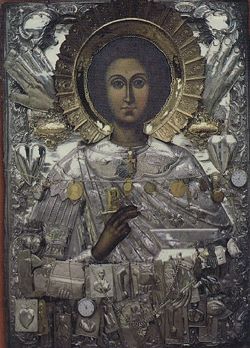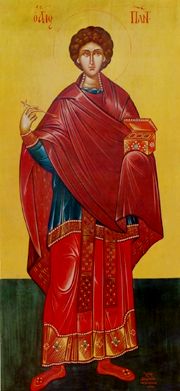Difference between revisions of "Panteleimon"
m |
|||
| (One intermediate revision by one other user not shown) | |||
| Line 6: | Line 6: | ||
His parents were Eustorgius of Nicomedia, a pagan, and [[Saint]] Eubula ([[March 30]]). They named him ''Pantaleon,'' which means ''in all things like a lion,'' but when he [[conversion|converted]] to Christianity, he changed his name to ''Panteleimon'', which means ''all-merciful.'' He learned about Christianity from the [[priest]] who later [[baptism|baptized]] him, Saint Hermolaus. Hermolaus was living with two other priests, Hermippus and Hermocrates; the three were "survivors of the massacre of 20,000 Christians in 303 ([[December 28]])."<ref name="OCA">[http://ocafs.oca.org/FeastSaintsViewer.asp?SID=4&ID=1&FSID=102099 Holy Greatmartyr and Healer Panteleimon] ([[OCA]])</ref> | His parents were Eustorgius of Nicomedia, a pagan, and [[Saint]] Eubula ([[March 30]]). They named him ''Pantaleon,'' which means ''in all things like a lion,'' but when he [[conversion|converted]] to Christianity, he changed his name to ''Panteleimon'', which means ''all-merciful.'' He learned about Christianity from the [[priest]] who later [[baptism|baptized]] him, Saint Hermolaus. Hermolaus was living with two other priests, Hermippus and Hermocrates; the three were "survivors of the massacre of 20,000 Christians in 303 ([[December 28]])."<ref name="OCA">[http://ocafs.oca.org/FeastSaintsViewer.asp?SID=4&ID=1&FSID=102099 Holy Greatmartyr and Healer Panteleimon] ([[OCA]])</ref> | ||
| − | St. Panteleimon had been educated as a physician, and he "dedicated his life to the suffering, the sick, the unfortunate and the needy. He treated all those who turned to him without charge, healing them in the name of [[Jesus Christ]]. He visited those held captive in prison. These were usually Christians, and he healed them of their wounds. In a short time, reports of the charitable physician spread throughout the city. Forsaking the other doctors, the inhabitants began to turn only to St. Panteleimon."<ref name="OCA" /> | + | St. Panteleimon had been educated as a physician, and soon he devoted all his talent to [[serving the poor]]. He "dedicated his life to the suffering, the sick, the unfortunate and the needy. He treated all those who turned to him without charge, healing them in the name of [[Jesus Christ]]. He visited those held captive in prison. These were usually Christians, and he healed them of their wounds. In a short time, reports of the charitable physician spread throughout the city. Forsaking the other doctors, the inhabitants began to turn only to St. Panteleimon."<ref name="OCA" /> |
Other physicians brought his case before the Emperor Maximian. St. Panteleimon confessed to being a Christian and refused to offer sacrifice to the state gods. | Other physicians brought his case before the Emperor Maximian. St. Panteleimon confessed to being a Christian and refused to offer sacrifice to the state gods. | ||
| Line 32: | Line 32: | ||
==References== | ==References== | ||
<references /> | <references /> | ||
| + | |||
| + | ==See also== | ||
| + | * [[Philanthropy]] | ||
==External links== | ==External links== | ||
| Line 51: | Line 54: | ||
[[es:Pantaleimon]] | [[es:Pantaleimon]] | ||
[[mk:Свети великомаченик Пантелејмон]] | [[mk:Свети великомаченик Пантелејмон]] | ||
| + | [[pt:Pantelimão, o Médico]] | ||
[[ro:Pantelimon]] | [[ro:Pantelimon]] | ||
Latest revision as of 14:39, June 17, 2020

The holy, glorious and right-victorious Greatmartyr Panteleimon (born Pantaleon) the Unmercenary Healer was martyred under the reign of Emperor Maximian (ca. 305 A.D.). His feast day is celebrated on July 27.
Contents
Life
His parents were Eustorgius of Nicomedia, a pagan, and Saint Eubula (March 30). They named him Pantaleon, which means in all things like a lion, but when he converted to Christianity, he changed his name to Panteleimon, which means all-merciful. He learned about Christianity from the priest who later baptized him, Saint Hermolaus. Hermolaus was living with two other priests, Hermippus and Hermocrates; the three were "survivors of the massacre of 20,000 Christians in 303 (December 28)."[1]
St. Panteleimon had been educated as a physician, and soon he devoted all his talent to serving the poor. He "dedicated his life to the suffering, the sick, the unfortunate and the needy. He treated all those who turned to him without charge, healing them in the name of Jesus Christ. He visited those held captive in prison. These were usually Christians, and he healed them of their wounds. In a short time, reports of the charitable physician spread throughout the city. Forsaking the other doctors, the inhabitants began to turn only to St. Panteleimon."[1]
Other physicians brought his case before the Emperor Maximian. St. Panteleimon confessed to being a Christian and refused to offer sacrifice to the state gods.
- "[He] suggested that a sick person, for whom the doctors held out no hope, should be brought before the emperor. Then the doctors could invoke their gods, and Panteleimon would pray to his God to heal the man. A man paralyzed for many years was brought in, and pagan priests who knew the art of medicine invoked their gods without success. Then, before the very eyes of the emperor, the saint healed the paralytic by calling on the name of Jesus Christ. The ferocious Maximian executed the healed man, and gave St. Panteleimon over to fierce torture."[1]
Hermolaus, Hermippus, and Hermocrates were brought forth; they confessed and were beheaded. Throughout the many tortures, St. Panteleimon remained untouched. Enraged, Maximian ordered that St. Panteleimon be beheaded. The soldiers took him to an olive tree, but when they struck him while he was praying, the sword melted like wax. After he finished his prayer, "a Voice was heard from Heaven, calling the passion-bearer by his new name and summoning him to the heavenly Kingdom."[1] He instructed the soldiers to rise from their knees where they had fallen in fear and to complete the execution. After they followed his instruction, the olive tree became covered with fruit.
Although his body was thrown into a fire, it came out unharmed and was buried by Christians. His head is located on the island of Andros at the Panachrantos monastery[2] and, on occassions, is taken to other monasteries for veneration. Some of his relics can be found at the Putna Monastery (Bucovina, Romania), as well as in the Ss. Peter and Paul Cathedral in Constanţa, Romania.
"St. Panteleimon is invoked in the prayers at the blessing of water and the blessing of oil, together with St. Hermolaus and the other unmercenaries and wonder-workers."[3] There is an Akathist hymn in his honor.
Hymns
Apolytikion (Tone 3)[4]
- Panteleimon, saintly champion and healer,
- intercede with our merciful God to grant our souls remission of sins.
Kontakion (Plagal of the First Tone or Fifth Tone)
- O Champion and Martyr of God,
- imitating the Merciful and bearing from Him the grace of healing,
- cure our spiritual ills by your prayers,
- and set free from the temptation of the eternal enemy,
- those who ceaselessly cry out, "Save us, O Lord."
References
See also
External links
- Holy Greatmartyr and Healer Panteleimon (hymns) (Hymns from Orthodox Church in America website)
- Icon of St. Panteleimon with scenes from his life
- Akathist to Great Martyr-Healer Panteleimon (PDF)
- Wikipedia: Saint Pantaleon
- Saint Pantaleon (Catholic Encyclopedia)
Categories > Church History
Categories > Church History
Categories > Church History
Categories > Church History
Categories > Church History
Categories > Church History
Categories > Church History
Categories > Liturgics > Feasts
Categories > Liturgics > Feasts
Categories > Liturgics > Feasts
Categories > Liturgics > Feasts
Categories > Liturgics > Feasts
Categories > Liturgics > Feasts
Categories > Liturgics > Feasts
Categories > People > Saints
Categories > People > Saints > Ante-Nicene Saints
Categories > People > Saints > Byzantine Saints
Categories > People > Saints > Greek Saints
Categories > People > Saints > Martyrs
Categories > People > Saints > Saints by century > 4th-century saints
Categories > People > Saints > Unmercenaries
